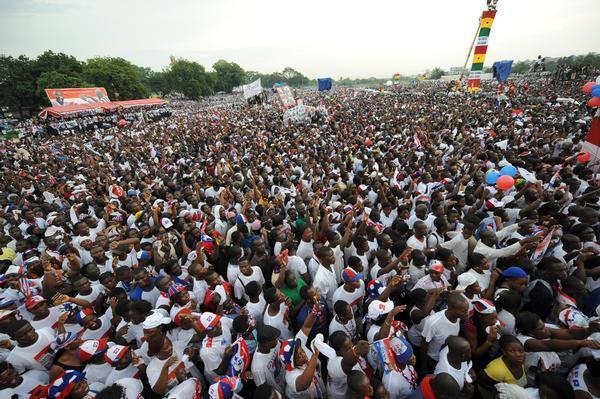Senior Lecturer at the University of Ghana Business School (UGBS), Dr Kobby Mensah, says the New Patriotic Party’s (NPP) gains in the 2016 elections are not necessarily consolidated gains.
He said the NPP had failed to pick up the apathetic voters of the NDC between the 2012 and 2016 elections, and is unlikely to pick them up in this years’ elections too.
Speaking to Daniel Dadzie on Joy Prime’s morning show, he noted that should there be a huge turnout in the upcoming December 7, elections it might hurt the NPP’s chances of winning.
He explained that, “If you look at the 2016 elections, the records, you’ll realise that the gains of the NPP is not necessarily a consolidated gain. It is a gain that is as a result of the apathy of the NDC which is widely discussed.
“The data actually shows, because where the 1million votes difference actually comes from, majority of the spaces are you’d say the NDC’s kind of area and then you’d also realise that the differential between the NDC’s performance in 2012 and 2016 are not necessarily picked up by the NPP.
“So the point is that if there is a huge turnout - which this election kind of gives an incline that there’s going to be - then it means that the NDC is likely to fill its gap and that would be a problem for the NPP.”
He added that, “In my view, you’re going to have the apathetic voters of the NDC turning up and then you’re going to have on the other hand the NPP, having apathetic voters because the one central theme of good governance had been limited in terms of government’s performance.”
Meanwhile, Political Scientist, Dr John Osae Kwapong who was also on the show stated that the ruling party, the NPP had more public approval than the NDC when they were the government incumbent.
According to him, five out of ten Ghanaians approve of the ruling government’s handling of state issues thus, “the current incumbent which is the NPP government is going into the 2020 election looking stronger than where the incumbent in 2016 stood going into the 2016 election.”
He said, “Based on the data and all of my analyses I can confidently say that they [the NPP] are in a much stronger position seeking re-election based on all of the data that I’ve looked at than the incumbent [the NDC] looked in 2016.
“Even if you look at all the issues and how this current government is ranked, you still get at least five out of ten voters approving of the way they’re handling some of those government issues which is still ahead of how they perceive the previous incumbent so this current incumbent still holds - even on their worst day - a slight advantage over the previous incumbent.”
Latest Stories
-
Police escort vehicle somersaults in near-fatal crash near Binduri
1 minute -
Sir Sam Jonah commends Mahama as he backs youth leadership to transform Ghana
29 minutes -
Embrace the ‘F word’; Failure is the path to success – Sir Sam Jonah
2 hours -
Build relationships that matter – Sir Sam Jonah advises Ghanaian youth
2 hours -
“I was a labourer in the Obuasi mines” – Sir Sam Jonah shares humble beginning
4 hours -
Africa doesn’t need more people with power, money or fame but character – Sir Sam Jonah
4 hours -
Celebrating Melvina Amoafo: A Legacy of excellence in Ghana’s capital market
5 hours -
Restoring Meritocracy: A path to effective governance in Ghana
5 hours -
Relief as Agavedzi Sea Defence Project officially begins
5 hours -
Engr. Kwame Adu-Mante celebrates professional milestone with IET Ghana
6 hours -
Elizabeth Amoaa’s quest to empower women, transform lives and raise voices
9 hours -
Gauff beats Sabalenka to win French Open title
9 hours -
Deputy Finance Minister urges diasporans to continue sending remittances despite cedi appreciation
10 hours -
Asante Mamponghene’s burial rites attract thousands of mourners
10 hours -
“The job was waiting for me”: MTN Ghana CFO shares career journey
11 hours

